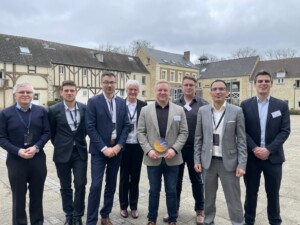A novel training for future sustainability guidance
Early design stages provide most leverage for resource-efficient technologies, but prospective environmental assessment is rarely performed due to a lack of knowledge, data, and analysis tools. MIN-TEA project provides education and software enabling industry and academia to screen emerging technologies for environmental hotspots. This is critical for sustainable raw materials management, security of supply, resource efficiency, circularity, as well as the competitiveness of the European industry.
Supported by EIT RawMaterials, the MIN-TEA project envisions a sustainable future for new technologies. Prospective Life Cycle Assessment (LCA) is increasingly used to guide the sustainability of emerging technologies. MIN-TEA provides a first-of-its-kind dedicated course for prospective LCA to key stakeholders who are involved in the development and guidance of our emerging technologies. The project offers practical software tools to assess future technology scenarios and take into account contextual developments such as the energy transition (a novelty for LCA software). This makes LCA research much more relevant and targeted for guiding emerging technologies towards sustainable technologies. MIN-TEA project thus helps to shape the future technology landscape to meet climate and other environmental targets.
Addressing the gaps for Life Cycle Assessment of emerging technologies
The MIN-TEA project was the perfect opportunity to develop a course on prospective LCA and support it with custom LCA software that addresses some of the gaps for LCA of emerging technologies. Our newly developed software is now the first of its kind that can take future scenarios practically into consideration and provides thus a much better basis for targeted environmental decision support.
Dr Bernhard Steubing, Assistant Professor at Leiden University
The education and software developed in MIN-TEA provide a methodology and practical tools to select promising technologies and guide these during their development to ensure that they become as sustainable as possible. The importance of such guidance, be it at the level of individual technologies or the broader systems analysis, is vital in the transition to a sustainable economy.
PhD education developed by the MIN-TEA project trains the future generation of Life Cycle Assessment practitioners, researchers and technology developers. In addition, prospective LCA results can be used for communication with decision-makers in companies, policy and the public (consumers). Customers will be affected through technology development or information provided by private and public entities about the sustainability of products. The industry will benefit greatly from using the newly developed software and hiring sustainability guides trained by the MIN-TEA project team.
The project is now over, but the team is currently discussing how to continue the education at MSc and PhD levels in the future.





